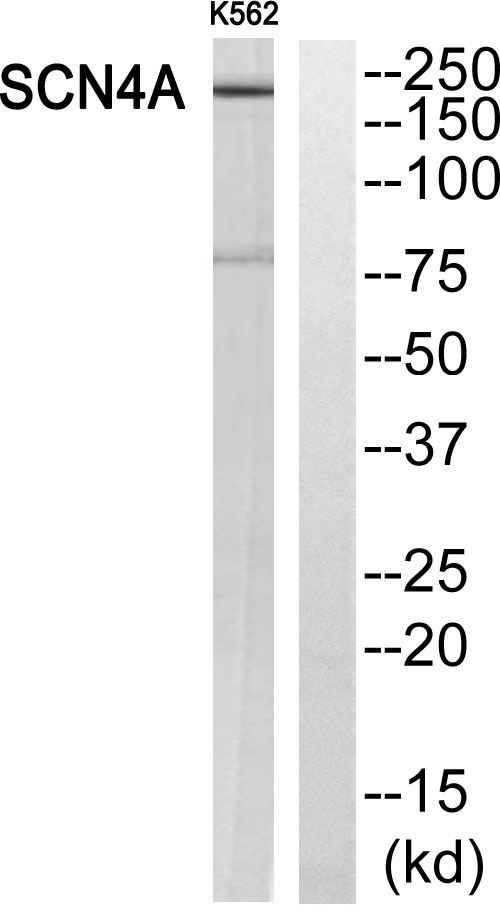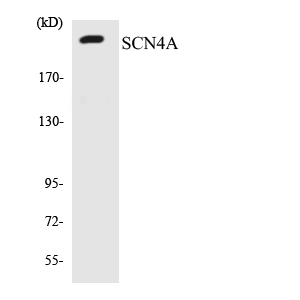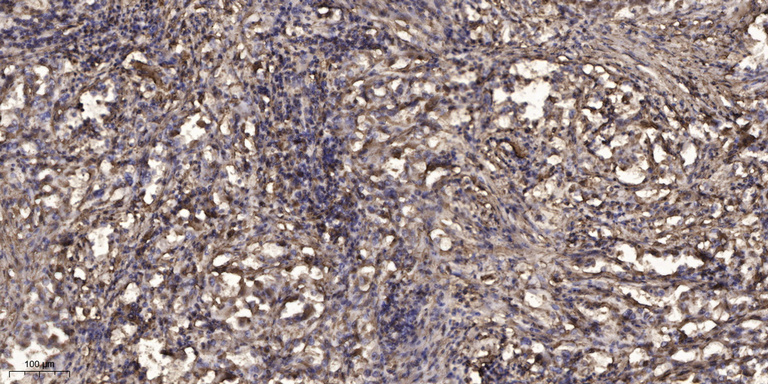Na+ CP type IVα Polyclonal Antibody
- Catalog No.:YT2966
- Applications:WB;IHC
- Reactivity:Human;Mouse;Rat
- Target:
- Na+ CP type IVα
- Gene Name:
- SCN4A
- Protein Name:
- Sodium channel protein type 4 subunit alpha
- Human Gene Id:
- 6329
- Human Swiss Prot No:
- P35499
- Mouse Gene Id:
- 110880
- Mouse Swiss Prot No:
- Q9ER60
- Rat Gene Id:
- 25722
- Rat Swiss Prot No:
- P15390
- Immunogen:
- The antiserum was produced against synthesized peptide derived from human SCN4A. AA range:431-480
- Specificity:
- Na+ CP type IVα Polyclonal Antibody detects endogenous levels of Na+ CP type IVα protein.
- Formulation:
- Liquid in PBS containing 50% glycerol, 0.5% BSA and 0.02% sodium azide.
- Source:
- Polyclonal, Rabbit,IgG
- Dilution:
- WB 1:500-2000;IHC 1:50-300
- Purification:
- The antibody was affinity-purified from rabbit antiserum by affinity-chromatography using epitope-specific immunogen.
- Concentration:
- 1 mg/ml
- Storage Stability:
- -15°C to -25°C/1 year(Do not lower than -25°C)
- Other Name:
- SCN4A;Sodium channel protein type 4 subunit alpha;SkM1;Sodium channel protein skeletal muscle subunit alpha;Sodium channel protein type IV subunit alpha;Voltage-gated sodium channel subunit alpha Nav1.4
- Observed Band(KD):
- 200kD
- Background:
- Voltage-gated sodium channels are transmembrane glycoprotein complexes composed of a large alpha subunit with 24 transmembrane domains and one or more regulatory beta subunits. They are responsible for the generation and propagation of action potentials in neurons and muscle. This gene encodes one member of the sodium channel alpha subunit gene family. It is expressed in skeletal muscle, and mutations in this gene have been linked to several myotonia and periodic paralysis disorders. [provided by RefSeq, Jul 2008],
- Function:
- disease:Defects in SCN4A are a cause of periodic paralysis hypokalemic (HOKPP) [MIM:170400]; also designated HYPOPP. HOKPP is an autosomal dominant disorder manifested by episodic flaccid generalized muscle weakness associated with falls of serum potassium levels.,disease:Defects in SCN4A are the cause of a congenital myasthenic syndrome due to mutation in SCNA4 (CMSSCNA4) [MIM:603967]. CMSSCNA4 is a congenital myasthenic syndrome associated with fatigable generalized weakness and recurrent attacks of respiratory and bulbar paralysis since birth. The fatigable weakness involves lid-elevator, external ocular, facial, limb and truncal muscles and an decremental response of the compound muscle action potential on repetitive stimulation.,disease:Defects in SCN4A are the cause of myotonia SCN4A-related (MYOSCN4A) [MIM:608390]. Myotonia is characterized by sustained muscle tensing that prevent
- Subcellular Location:
- Cell membrane ; Multi-pass membrane protein .
- Expression:
- Skeletal muscle,
- June 19-2018
- WESTERN IMMUNOBLOTTING PROTOCOL
- June 19-2018
- IMMUNOHISTOCHEMISTRY-PARAFFIN PROTOCOL
- June 19-2018
- IMMUNOFLUORESCENCE PROTOCOL
- September 08-2020
- FLOW-CYTOMEYRT-PROTOCOL
- May 20-2022
- Cell-Based ELISA│解您多样本WB检测之困扰
- July 13-2018
- CELL-BASED-ELISA-PROTOCOL-FOR-ACETYL-PROTEIN
- July 13-2018
- CELL-BASED-ELISA-PROTOCOL-FOR-PHOSPHO-PROTEIN
- July 13-2018
- Antibody-FAQs
- Products Images

- Western blot analysis of SCN4A Antibody. The lane on the right is blocked with the SCN4A peptide.

- Western blot analysis of the lysates from COLO205 cells using SCN4A antibody.

- Immunohistochemical analysis of paraffin-embedded human Squamous cell carcinoma of lung. 1, Antibody was diluted at 1:200(4° overnight). 2, Tris-EDTA,pH9.0 was used for antigen retrieval. 3,Secondary antibody was diluted at 1:200(room temperature, 45min).



